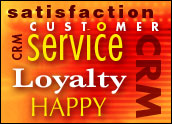
In late 2002, Microsoft rolled out the first version of its CRM software, targeted toward mid-market companies. In the intervening year, the company reports, more than 1,000 companies have purchased the product and praised its ease of use and painless integration.
Not all companies are so enthusiastic, however. Some report software glitches, upgrade difficulties and the need for add-ons to increase functionality.
Despite the software’s imperfections, many do agree that several common CRM problems have been solved by Microsoft’s offering, including interoperability with other applications.
As Microsoft refines its software in future upgrades, will the company, led by chairman Bill Gates, be able to leap past CRM’s biggest stumbling blocks?
Stumbling Blocks
Even though more and more companies are implementing CRM, whether in-house or hosted, the same problems that have plagued CRM since its earliest days seem to keep cropping up.
Companies often complain that CRM software is difficult to use, hard to administer or troublesome to deploy. Lack of interoperability with other applications also is a familiar lament, as is high cost.
Especially in the small and medium business (SMB) market, worries about these issues have prevented many firms from migrating to CRM from the database applications they use to track sales leads and customer contacts.
Additionally, Yankee Group program manager Sheryl Kingstone told CRM Buyerthat many companies implement CRM to solve a specific problem or pain point, then find that money is wasted because they did not think about how to use the application over the long term.
“By not looking at the big picture, you could potentially be losing money,” she said. “That can happen even if CRM has solved the initial problem.”
Fixing Some Holes
The greatest benefit Microsoft CRM brings to businesses is simple ease of use, according to Astrid Klopsch, director of operations at Opal Enterprises.Klopsch told CRM Buyer that her company chose Microsoft over other competitors because it needed an application that was extremely user friendly.
The software also may trump some competing alternatives in terms of integration with existing applications. Because Microsoft’s Outlook and Office programs are widely used, the company’s CRM application can be integrated into a system in a way that is usually less time-consuming and less fraught with interoperability issues. In a recent report, AMR Research analyst Laura Preslan noted that SMBs in particular find integration with Outlook very appealing.
Diane James, executive director at Women in Cable and Telecommunications, told CRM Buyer that she is impressed that Microsoft is reaching out to the association community, a market few CRM vendors have targeted. “They’ve done a great job at making associations feel that the programs are customized for their needs,” she said.
Limited Appeal
However, the Redmond, Washington-based software giant is far from dominant in the market. Preslan noted that, so far, Microsoft CRM is only a good fit for SMBs that have basic sales, marketing and service processes, basic functionality requirements, low productivity complexity and a need to implement the application exclusively in the United States.
Indeed, functionality limitations have kept some customers from embracing Microsoft CRM without reservation. Peggy Warley, vice president of customer satisfaction at HyPerformix, told CRM Buyer that her company has encounteredsignificant challenges in implementing and using the program.
Specifically, Warley noted that HyPerformix has faced a longer-than-anticipated training process, and that it can be difficult to work around a variety of limitations involving report generation, workflow monitoring and modification of activity screens. Also, Hyperformix migrated from ACT! and found that process to be particularly challenging.
“I don’t think we could have done it without working with our reseller,” she said. “I would recommend that people work with a partner, because implementation, especially from a database program, can get pretty hairy.”
Future Fix-It?
Despite its flaws, Microsoft CRM does have potential to significantly impact the CRM sector and facilitate change in the industry. Analysts, including Preslan and Kingstone, still consider Microsoft’s offering to be in the early stages of adoption. A recent upgrade provided an increase in functionality, and analysts noted that Microsoft’s huge financial resources, coupled with a gain in market share, should make it aworthy contender in the CRM industry.
Customers like Klopsch, Warley and James also are confident that future versions of the software will work out the bugs — and that widespread adoption will occur at that point.
“Early Microsoft CRM adopters are more than willing to overlook key functionality gaps in the current product,” Preslan wrote in her report, adding that customers are “confident that Microsoft will fill these holes over time and will be in business in the long run.”
In the end, many companies in the SMB market may consider using Microsoft CRM based solely on brand, and they also may use the software to replace some of their non-CRM processes, such as database use.
“It has its problems, but one major reason we selected it is because it’s from Microsoft,” James said. “I think other companies and associations will continue to choose it for that reason alone.”











































